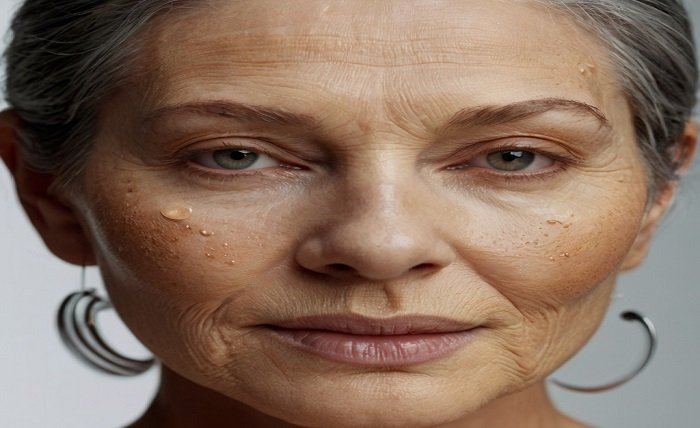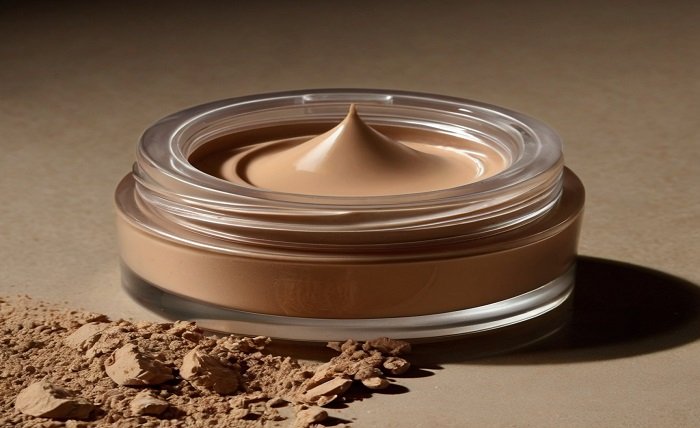Best Foundation For Mature Skin: Our skin changes with age, and keeping a youthful, radiant appearance requires knowing which foundation is ideal for mature skin. Selecting a foundation that enhances rather than draws attention to the indications of aging is crucial because mature skin frequently exhibits diminished suppleness, dryness, and fine wrinkles. This article will examine the best foundation solutions for mature skin, provide application advice, and highlight important considerations for selecting the right product.
Read more about: modern mullet
Comprehending the Requirements of Mature Skin

The characteristics of mature skin usually determine the choice of foundation. The natural oils in our skin diminish with age, leaving our skin looking parched and lifeless. Additionally, age spots, wrinkles, and fine lines could become more noticeable. The best foundation for mature skin should address these issues by providing hydration, coverage, and a flawless finish. Because you are aware of these demands, you can choose a foundation that minimizes blemishes and brings out the natural beauty of your skin.
There are important foundation components to consider
Best Foundation for mature skin: When searching for the best foundation for aging skin, consider formulas enhanced with helpful components. Hyaluronic acid and glycerine are hydrating ingredients that plump the skin and minimize the appearance of fine wrinkles. Antioxidants such as vitamins C and E found in foundations can also protect the skin from environmental damage and improve its texture. Foundations containing collagen or peptides can also support skin firmness and elasticity.
The top types of foundation are ideal for mature skin
For skin that is mature, selecting the appropriate foundation type is essential. Some of the top foundation types for aging skin are as follows:
Liquid Foundations: Made with moisturizing elements, liquid foundations provide buildable coverage, making them ideal for mature skin types. Their polished appearance allows for customization to meet various covering requirements.
Cream Foundations: Because of their moisturizing qualities, cream foundations are also a great option for aging skin. They can help hide flaws without clinging to fine lines, providing complete coverage.
Stick Foundations: These are precise and convenient. They combine hydration and coverage in one product and are frequently more emollient, making them an excellent choice for dry or mature skin.
The Best Foundations for Age-Released Skin
Best Foundation for mature skin: Certain options stand out as the best for mature skin. Here are a few highly suggested choices:
Estée Lauder Stay-in-Place Double Wear Cosmetics: This foundation, which is well-known for its long-lasting composition, offers superb coverage and a flawless finish that doesn’t settle into lines.
IT Cosmetics Your Skin But Better CC+ Cream: This CC cream improves the skin’s texture and brightness while providing complete coverage, SPF protection, and hydration.
The foundation of L’Oréal Paris Age Perfect Radiant Serum: This foundation, enhanced with moisturizing serum and SPF, leaves skin looking more radiant and naturally finished.
NARS Sheer Glow Foundation: This foundation evens up skin tone, moisturizes, and gives buildable coverage—perfect for anybody looking for a dewy, radiant finish.
How to Select the Appropriate Hue
Choosing the ideal shade that complements your skin tone is essential to finding the finest foundation for mature skin. Take into account the following advice to select the ideal shade:
Test hues: To find a foundation shade that complements your skin tone without looking cakey, try different hues on your wrists or jawline.
Think about the undertones: Determine the undertones of your skin: warm, cold, or neutral. For a natural look, pick a foundation hue that goes well with your undertones.
Verify in Natural Light: Always check your foundation to see if it matches your skin tone and doesn’t look too light or dark.
Here are some tips for applying makeup on mature skin
Best Foundation for mature skin: The proper application of foundation can significantly impact a flawless finish. The following advice can help you apply foundation to older skin:
Prepare Your Skin: Begin with a moisturizing primer to provide a smooth base and increase the longevity of the foundation.
Use a wet sponge: To apply foundation smoothly and produce a natural finish, use a wet beauty sponge.
Refrain from overapplying: Add foundation in small amounts and increase coverage as necessary. Applying too much makeup can accentuate wrinkles and fine lines.
Set with Powder: To guarantee a long-lasting finish and less shine, lightly set your foundation with a translucent powder. Steer clear of dense powders that may cause streaks.
Preventing Typical Errors
Best Foundation for mature skin: Avoid these common blunders while selecting and applying the best foundation for older skin, as they can impact your entire appearance:
Steer clear of matte formulas: because they can draw attention to small wrinkles and dryness. For a youthful glow, choose radiant or moisturizing formulations.
Avoid Heavy Coverage: Heavy, full-coverage foundations can draw attention to flaws and make them appear cakey. For a more natural look, choose formulas with buildable coverage.
Use SPF with caution: Although it’s important, some high-SPF foundations can seem white in pictures. Use a separate sunscreen or foundation with a balanced SPF level.
Top application tools
The right tools can improve your foundation application. The following are some of the top sponges to use while putting foundation on older skin:
A damp beauty: sponge allows for a smooth application and easy foundation blending.
Foundation Brush: For cream or stick foundations, in particular, a dense, flat brush can provide accurate application and coverage.
Fingers: Using your fingers to apply foundation can help warm the material and mix it in flawlessly for a more natural-looking finish.
Maintaining a robust foundation throughout the day
Maintaining the fresh appearance of your foundation throughout the day requires some work. Here are some pointers to guarantee that your foundation stays perfect:
Blotting sheets: To keep your makeup from looking oily or shiny, use blotting sheets to absorb extra oil.
Setting Spray: Using a setting spray can help keep your makeup in place by locking in your foundation and extending its longevity.
Touch-Up Tools: To keep your look immaculate, always have a small, compact powder or foundation stick on hand for quick touch-ups.
Concluding Remarks and Concluding Ideas
Best Foundation for mature skin: When choosing the best foundation for older skin, consider factors like formula types, application methods, and ingredients. You can create a beautiful, young complexion by choosing a foundation that addresses the particular demands of aged skin, such as hydration and coverage. For optimal effects, experiment with various hues, use appropriate application equipment and keep your foundation in place all day.
Read more: technewztop
FAQ
Which kind of foundation works best on skin that has aged? Because they may give smooth, even coverage and are moisturizing, liquid and cream foundations work best for aged skin. It can also work well if the stick foundation is not too heavy and emollient.
How can I pick the ideal foundation hue for my aging skin? Choose a foundation shade that complements your skin’s undertone and natural skin tone. To make sure the tints match seamlessly, test them on your wrist or jawline and inspect them in natural light.
For older skin, should I use a primer in addition to foundation? Yes, applying a hydrating primer can improve the lifespan of the foundation, smooth out the skin, and lessen the appearance of fine lines.
How can I apply foundation without drawing attention to fine lines? For a flawless blend, apply foundation sparingly with a damp beauty sponge or brush. To prevent emphasizing fine wrinkles, stay away from thick coverage and choose moisturizing products.
I have aged skin; may I use an SPF foundation? Although SPF is helpful, use caution when applying high SPF levels, as they may result in a white cast in photographs. For optimal effects, use a separate sunscreen or foundation with a balanced SPF.

